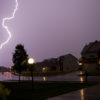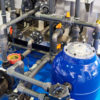If you enjoy swimming during the cooler months of the year and want to swim in a warm swimming-pool, Pool Troopers would like to offer some tips on how your swimming environment can be heated, while being easier on your budget and comfortable for your body. To begin, however, we have some reasons for heating your water that might improve your well-being, as well as the fun factor.
The advantages of heating your pool:
Some of the more therapeutic reasons to swim in warm water include the following benefits:
- Relief of muscle aches
- Great for cardio exercise
- Helps with recovery from accidents and surgery
- Improved circulation
- Relief from arthritis
- Reduction in lactic acid after gym workouts
- Improvement of mood
- Increased fun factor
A heated pool in your backyard is a convenient and easy way to get many benefits.
You are probably asking, “How do I keep my pool heated while keeping my energy bills under control?” Here are some options for covers that will help retain the heat in your pool.
Different Types of Pool Covers
There are some cost-effective measures for keeping your pool heated from utilizing free energy from the sun, to finding the right heater for you pool.
The best way to save money when heating your pool is to make sure you have a plan to retain the heat you put in the water. This means a cover of some sort. Here are the best cover options to retain heat.
- Floating pool cover
Pool covers are an effective means of keeping the heat in, as evaporation is a leading cause of heat loss. Between gusts of wind and the heat from the sun, heat loss occurs. However, with a protective lid on your water environment, evaporation is reduced. You’ll be surprised at the results, since 75 percent of lost heat is from evaporation. Pool covers both retain heat and keep heat loss from occurring through evaporation. Pool covers offer a safety hazard however and should only be used on pools with pool safety fencing in place. - Liquid solar cover
This type of cover adds a barrier to your water to prevent loss of heat through evaporation. Perfectly safe for swimming, the chemicals are bio-degradable and can take the place of other means of keeping warm water in the pool.
Covering a Heated Pool is a MUST, but how do I heat my Pool?
1. Gas Heater (Ideal for quick heating for small bodies of water or spas).
Gas Heaters are costly to run on a pool, but for spas and very small pools a gas heater may be the right way to add heat. Please consult a pool professional to get the best advice. If you are someone who has to swim every day regardless of the temperature outside, a gas heater combined with a heat pump is for you. The heat pump will operate most of the time saving money while the gas heater will override on those cold days when the heat pump is not getting the job done.
Check out our video on the advantages of Gas Heaters: https://www.youtube.com/watch?v=L6gr5KOng5k
2. Heat Pump (Ideal for people who like to swim year-round).
This type of pump draws in the warmer air from the outside. It then warms the air that has been harvested using a low energy method. Next, it transfers that heat to your water. One benefit of the pump it that it does not require sunshine; it works during the overcast and cloudy days when you might want to take a dip. Heat pumps are most efficient for year-round swimmers
The heat pump works faster than some of the other methods mentioned above. Initially it might cost more; however, it can greatly extend your swim season.
Check out our video on the advantages of Heat Pumps: https://www.youtube.com/watch?v=BQeXuLhVHHY
3. Solar Heater (Ideal for people who want to extend their swim season).
By installing panels on your roof, you will have a more efficient solution that can heat your pool water. You will need a south facing and large area on which to mount the panels. These panels produce energy, not heat. They are environment-friendly but may take longer to heat your water.
A solar heater for the pool is comprised of solar panels attached to the pools circulation pump. According to this site a solar heater is both easy on the wallet as well as the environment. Temperature rises from 2 to 5 degrees for each circulation of the water. It usually requires 8 to 12 hours for all the water to pass through the system, resulting in a rise of temperature of from 5 to 15 degrees. In regard to in-ground designs, the solar panels’ total square footage should equal at least half of the water surface area. It is said that solar heating will last from 10 to 15 years with basic maintenance of the panels. This is a great option for our pool owners who are looking to extend their swim season.
The down sides are you may need to upgrade your pool equipment to push water onto your roof, the panels can diminish the sight lines of your house, and leaks can be hard to find and fix. Choose a reputable Solar Contractor to discuss solar options for your pool.
4. Solar Heater and Heat Pump Together
Both of these methods can be combined for an efficient and cost saving method of heating. Use the heat pump to bring the temperature to what is comfortable, then use the solar heater to maintain it. The pump will be covering the nights and cloudy days while the solar heater will be taking advantage of those sunnier days. Learn more about the combined energy here. Using both systems reduces wear and tear on using one alone.
Pro Tip: Regardless if you choose a gas heater or electric heater, make sure to always run your heater for 10-15 minutes monthly to ensure the lines are clean and clear. This will save you from a service call and extra costs down the road.
Regardless of what heating method you use remember to have a cover plan or the heat you add will evaporate at night.
These are some cost-effective tips for heating your swimming environment. Pool Troopers wants you to save money as well as swim year-round. You can choose any of these methods that fit your needs and budget. For solar solutions, unless you have a backup heat pump, you will want to take into consideration where you live and the weather that is typical as well as the environment-friendly factor.
Now that you have some tips on how to heat your water efficiently for year-round use, you should be thinking of maintaining a safe and clean swimming environment all year long. Pool Troopers can help you with a range of services. Contact us to learn more about how we can keep your pool clear, blue, swim safe, and warm!




